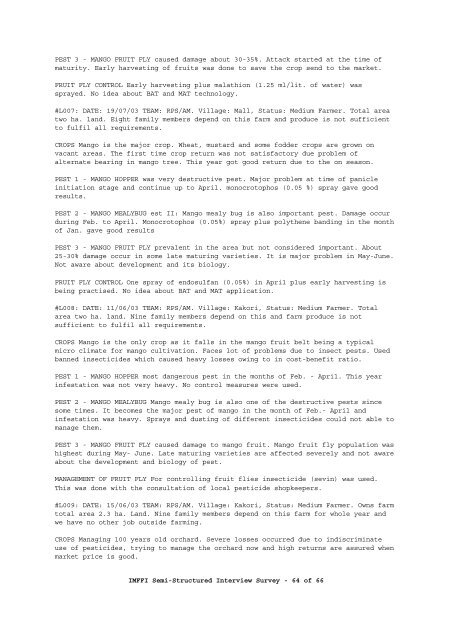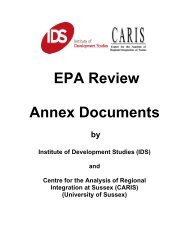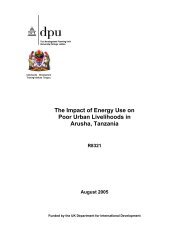“Key Informant Survey” of Production, Value, Losses and ... - DfID
“Key Informant Survey” of Production, Value, Losses and ... - DfID
“Key Informant Survey” of Production, Value, Losses and ... - DfID
You also want an ePaper? Increase the reach of your titles
YUMPU automatically turns print PDFs into web optimized ePapers that Google loves.
PEST 3 - MANGO FRUIT FLY caused damage about 30-35%. Attack started at the time <strong>of</strong><br />
maturity. Early harvesting <strong>of</strong> fruits was done to save the crop send to the market.<br />
FRUIT FLY CONTROL Early harvesting plus malathion (1.25 ml/lit. <strong>of</strong> water) was<br />
sprayed. No idea about BAT <strong>and</strong> MAT technology.<br />
#L007: DATE: 19/07/03 TEAM: RPS/AM. Village: Mall, Status: Medium Farmer. Total area<br />
two ha. l<strong>and</strong>. Eight family members depend on this farm <strong>and</strong> produce is not sufficient<br />
to fulfil all requirements.<br />
CROPS Mango is the major crop. Wheat, mustard <strong>and</strong> some fodder crops are grown on<br />
vacant areas. The first time crop return was not satisfactory due problem <strong>of</strong><br />
alternate bearing in mango tree. This year got good return due to the on season.<br />
PEST 1 - MANGO HOPPER was very destructive pest. Major problem at time <strong>of</strong> panicle<br />
initiation stage <strong>and</strong> continue up to April. monocrotophos (0.05 %) spray gave good<br />
results.<br />
PEST 2 - MANGO MEALYBUG est II: Mango mealy bug is also important pest. Damage occur<br />
during Feb. to April. Monocrotophos (0.05%) spray plus polythene b<strong>and</strong>ing in the month<br />
<strong>of</strong> Jan. gave good results<br />
PEST 3 - MANGO FRUIT FLY prevalent in the area but not considered important. About<br />
25-30% damage occur in some late maturing varieties. It is major problem in May-June.<br />
Not aware about development <strong>and</strong> its biology.<br />
FRUIT FLY CONTROL One spray <strong>of</strong> endosulfan (0.05%) in April plus early harvesting is<br />
being practised. No idea about BAT <strong>and</strong> MAT application.<br />
#L008: DATE: 11/06/03 TEAM: RPS/AM. Village: Kakori, Status: Medium Farmer. Total<br />
area two ha. l<strong>and</strong>. Nine family members depend on this <strong>and</strong> farm produce is not<br />
sufficient to fulfil all requirements.<br />
CROPS Mango is the only crop as it falls in the mango fruit belt being a typical<br />
micro climate for mango cultivation. Faces lot <strong>of</strong> problems due to insect pests. Used<br />
banned insecticides which caused heavy losses owing to in cost-benefit ratio.<br />
PEST 1 - MANGO HOPPER most dangerous pest in the months <strong>of</strong> Feb. - April. This year<br />
infestation was not very heavy. No control measures were used.<br />
PEST 2 - MANGO MEALYBUG Mango mealy bug is also one <strong>of</strong> the destructive pests since<br />
some times. It becomes the major pest <strong>of</strong> mango in the month <strong>of</strong> Feb.- April <strong>and</strong><br />
infestation was heavy. Sprays <strong>and</strong> dusting <strong>of</strong> different insecticides could not able to<br />
manage them.<br />
PEST 3 - MANGO FRUIT FLY caused damage to mango fruit. Mango fruit fly population was<br />
highest during May- June. Late maturing varieties are affected severely <strong>and</strong> not aware<br />
about the development <strong>and</strong> biology <strong>of</strong> pest.<br />
MANAGEMENT OF FRUIT FLY For controlling fruit flies insecticide (sevin) was used.<br />
This was done with the consultation <strong>of</strong> local pesticide shopkeepers.<br />
#L009: DATE: 15/06/03 TEAM: RPS/AM. Village: Kakori, Status: Medium Farmer. Owns farm<br />
total area 2.3 ha. L<strong>and</strong>. Nine family members depend on this farm for whole year <strong>and</strong><br />
we have no other job outside farming.<br />
CROPS Managing 100 years old orchard. Severe losses occurred due to indiscriminate<br />
use <strong>of</strong> pesticides, trying to manage the orchard now <strong>and</strong> high returns are assured when<br />
market price is good.<br />
IMFFI Semi-Structured Interview Survey - 64 <strong>of</strong> 66

















